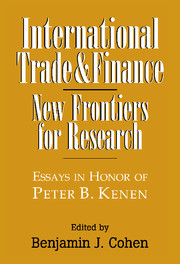Book contents
- Frontmatter
- Contents
- List of contributors
- Introduction
- 1 The practical theorist: Peter Kenen's contribution to international economics
- I International trade theory
- II International monetary theory
- III Applied policy analysis
- 9 Labor market adjustment and trade: Their interaction in the Triad
- 10 Do the G-3 countries coordinate monetary policy?
- 11 Fundamental determinants of Mexico's exchange-rate crisis of 1994
- 12 Devaluation cycles and adjustment costs
- 13 Payments problems in the Commonwealth of Independent States
- Index
13 - Payments problems in the Commonwealth of Independent States
Published online by Cambridge University Press: 11 September 2009
- Frontmatter
- Contents
- List of contributors
- Introduction
- 1 The practical theorist: Peter Kenen's contribution to international economics
- I International trade theory
- II International monetary theory
- III Applied policy analysis
- 9 Labor market adjustment and trade: Their interaction in the Triad
- 10 Do the G-3 countries coordinate monetary policy?
- 11 Fundamental determinants of Mexico's exchange-rate crisis of 1994
- 12 Devaluation cycles and adjustment costs
- 13 Payments problems in the Commonwealth of Independent States
- Index
Summary
Introduction
Integration of the previously centrally planned countries into the international economy has presented some of the most difficult challenges of transition to the market. State control of trade and foreign exchange, vastly distorted prices, and insufficiently developed financial institutions left countries in East-Central Europe and the former Soviet Union ill prepared to participate and benefit from international trade and finance. At the same time, their governments realized that without integration into the international economy, the transition to a market system would never be complete or successful.
In 1990, Peter Kenen prepared a report for the IMF that focused on the implications of price liberalization and moving to international prices and convertible currencies for trade and financial relationships among the countries of East-Central Europe that were members of the soon-tobe-defunct CMEA (Kenen 1991). He concluded that the needed economic reforms would worsen these countries' terms of trade and drive them into a current-account deficit with the USSR. He recommended the extension of medium-term financing from the USSR to individual countries and additional external financing from the international community to cope with the terms of trade shock.
In 1992, the USSR itself collapsed and in its place fifteen new countries emerged, all proceeding with price liberalization and moving to international prices and convertibility at a different pace.
- Type
- Chapter
- Information
- International Trade and FinanceNew Frontiers for Research, pp. 361 - 394Publisher: Cambridge University PressPrint publication year: 1997



